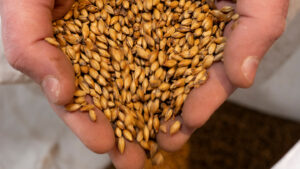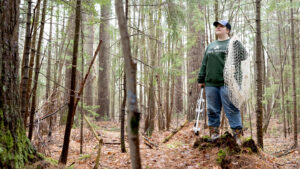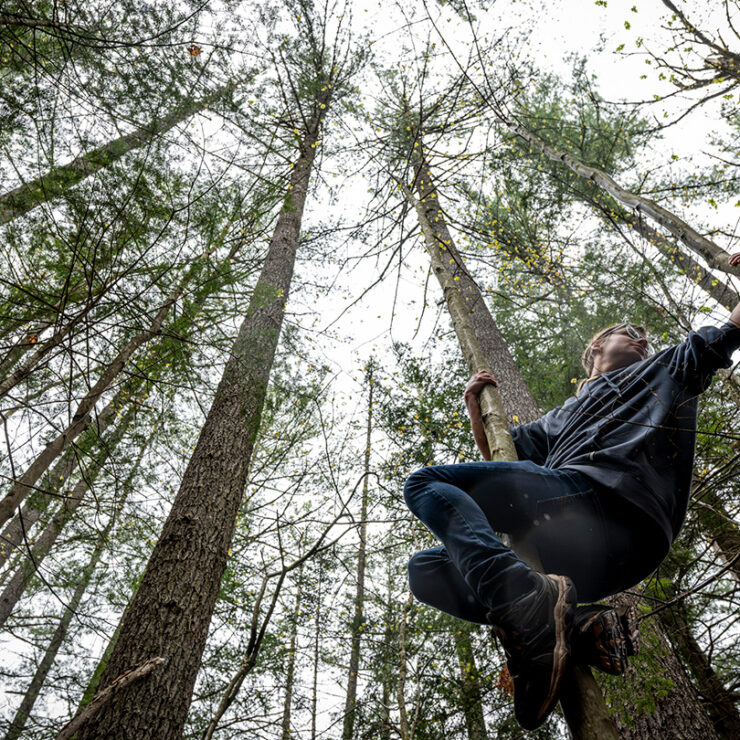Learn to connect people with the environment through positive advocacy, policy, education and entrepreneurial practices focused on durable landscapes, sustainable food systems and resilient communities.
Bachelor of Science / 120 Credits
In preparation for careers in this field, students will be provided with a program of study that integrates the natural, social, and management sciences. In addition, the program aims to help students develop tangible tools, including remote sensing and GIS, for assessing and managing sustainable enterprises, while providing an opportunity to develop creativity and curiosity through curriculum flexibility and open and restricted electives.
The program is firmly rooted in the core principles of experiential learning promoted at Paul Smith’s College, ensuring that students will not only develop the theoretical underpinning necessary for a successful career in this field, but will also have hands-on experience of the realities of managing resources sustainably. Given that the field of sustainable resource use is rapidly developing, the program will also incorporate a constantly evolving curriculum to ensure that graduates receive relevant training and remain at the forefront of the industry.
Program Details
Sustainability Bachelor of Science 120 Credits
- Sustainable Food Systems
- Conservation Design: Green Construction
- Sustainable Agriculture
- Community Disaster Resilience Planning
- Resilient Communities
- Global Water Studies
- Sustainable Development
- Community Organizing and Outreach
- Alternative Energy and Energy Efficiency
- Sustainability Coordinator
- Community Planning
- Environmental Law
- Environmental Educator
- Energy Auditor
- Farm to School Coordinator
- Sustainable Agriculture
- Energy Project Manager
SUSTAINABLE PRACTITIONER CLUSTER – CHOOSE 1
Draft Horse Mgt, Ecological Restoration, Food Writing, Greenhouse Turf Practice, Maple Sap & Syrup, Practical Brewing, Studio Art Courses, Sustainable Nature-Based Tourism, Sustainable Studies Field Exp, Wood Props & Prod Process, Writing on Nature & the Environment
|
Semester 1 |
||
|
BIO 110 |
Biology I |
3 |
|
ENG 101 |
Effective College Writing I |
3 |
|
FYS 101 |
First Year Seminar |
3 |
|
NRS 110 |
Introduction to Environment & Society |
3 |
|
SOC 115 |
Adirondack Studies |
3 |
|
Semester 2 |
||
|
COM 201 |
Interpersonal Communications |
3 |
|
EST 200 |
Intro Nature and Culture |
3 |
|
ENG 102 |
Effective College Writing II |
3 |
|
Math Skills |
3 |
|
|
Elective |
3-4 |
|
|
Semester 3 |
||
|
ENV 110 |
Environmental Science |
4 |
|
POL 202 |
Politics Of The Environment |
3 |
|
SUS 120 |
Sustainable Community Agriculture |
3 |
|
SUS 200 |
Conservation Design: Green Communities |
3 |
|
Humanities |
3 |
|
|
Semester 4 |
||
|
ECN 200 |
Principles of Economics |
3 |
|
MGT 250 |
Sustainable Practices Entrepreneurship |
3 |
|
SOC 220 |
Social Research |
3 |
|
Sustainable Practitioner Cluster |
3 |
|
|
Humanities |
3 |
|
|
Semester 5 |
||
|
EST 300 |
Ecological Change & Society |
3 |
|
SUS 310 |
Conservation Design: Green Construction |
3 |
|
SUS 340 |
Sustainable Food Systems |
3 |
|
SUS 360 |
Global Water Studies |
3 |
|
Liberal Arts and Science Elective |
3-4 |
|
|
Semester 6 |
||
|
ENV 455 |
Sustainable Development |
3 |
|
SOC 315 |
Community Organization & Outreach |
3 |
|
Liberal Arts and Science Elective* |
3 |
|
|
Elective |
3-4 |
|
|
Semester 7 |
||
|
NRS 410 |
Natural Resource Economics |
3 |
|
SUS 330 |
Community Disaster Resilience Planning |
3 |
|
Elective – UD |
3-4 |
|
|
Elective |
3-4 |
|
|
Elective |
3-4 |
|
|
Semester 8 |
||
|
SUS 350 |
Alternative Energy & Energy Efficiency |
3 |
|
SUS 496 |
Sustainability Capstone |
4 |
|
Elective – UD |
3-4 |
|
|
Elective – UD |
3-4 |
|
|
Elective – UD |
3-4 |
|
Sustainability
Sustainability


Questions? Let's get in touch.
Bailey Walton
Admissions
Director of Admissions
